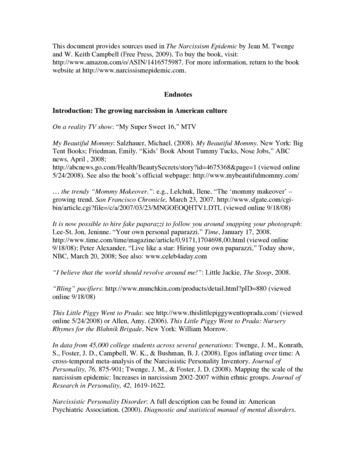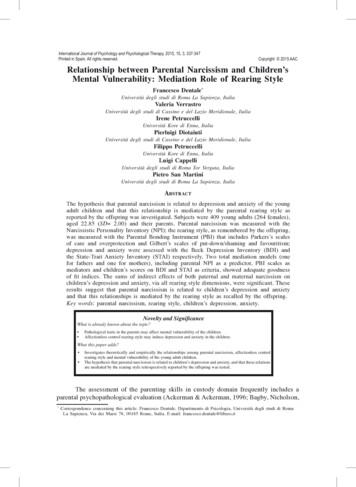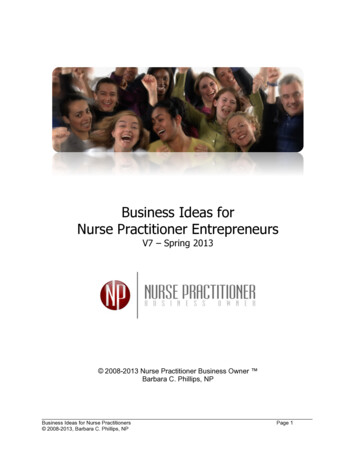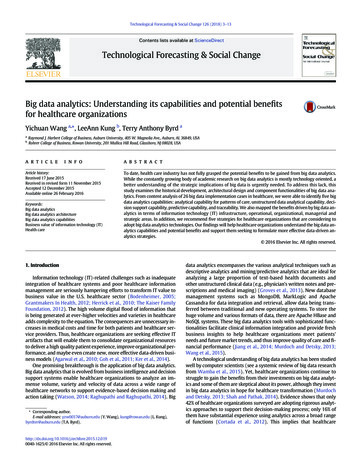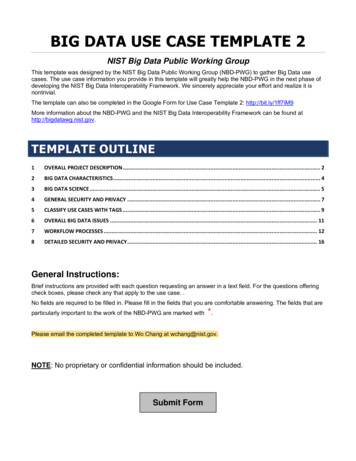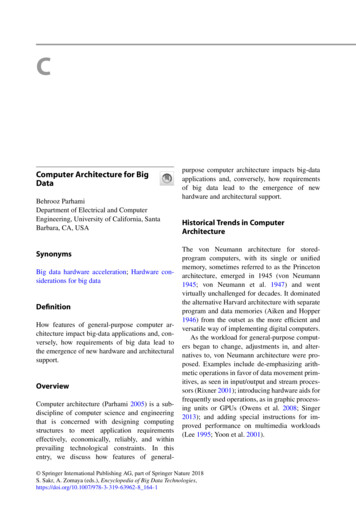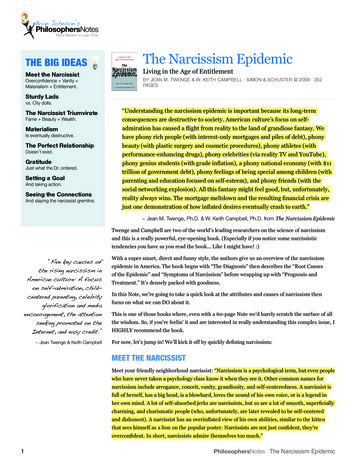
Transcription
Brian Johnson’sPhilosophersNotesTMMore Wisdom in Less TimeTHE BIG IDEASMeet the NarcissistOverconfidence Vanity Materialism Entitlement.The Narcissism EpidemicLiving in the Age of EntitlementBY JEAN M. TWENGE & W. KEITH CAMPBELL · SIMON & SCHUSTER 2009 · 352PAGESSturdy Ladsvs. City dolls.The Narcissist TriumvirateFame Beauty Wealth.MaterialismIs eventually destructive.The Perfect RelationshipDoesn’t exist.GratitudeJust what the Dr. ordered.Setting a GoalAnd taking action.Seeing the ConnectionsAnd slaying the narcissist gremlins.“Understanding the narcissism epidemic is important because its long-termconsequences are destructive to society. American culture’s focus on selfadmiration has caused a flight from reality to the land of grandiose fantasy. Wehave phony rich people (with interest-only mortgages and piles of debt), phonybeauty (with plastic surgery and cosmetic procedures), phony athletes (withperformance-enhancing drugs), phony celebrities (via reality TV and YouTube),phony genius students (with grade inflation), a phony national economy (with 11trillion of government debt), phony feelings of being special among children (withparenting and education focused on self-esteem), and phony friends (with thesocial networking explosion). All this fantasy might feel good, but, unfortunately,reality always wins. The mortgage meltdown and the resulting financial crisis arejust one demonstration of how inflated desires eventually crash to earth.” Jean M. Twenge, Ph.D. & W. Keith Campbell, Ph.D. from The Narcissism EpidemicTwenge and Campbell are two of the world’s leading researchers on the science of narcissismand this is a really powerful, eye-opening book. (Especially if you notice some narcissistictendencies you have as you read the book. Like I might have! :)“Five key causes ofthe rising narcissism inAmerican culture: A focuson self-admiration, childcentered parenting, celebrityglorification and mediaencouragement, the attentionseeking promoted on theInternet, and easy credit.” Jean Twenge & Keith CampbellWith a super smart, direct and funny style, the authors give us an overview of the narcissismepidemic in America. The book begns with “The Diagnosis” then describes the “Root Causesof the Epidemic” and “Symptoms of Narcissism” before wrapping up with “Prognosis andTreatment.” It’s densely packed with goodness.In this Note, we’re going to take a quick look at the attributes and causes of narcissism thenfocus on what we can DO about it.This is one of those books where, even with a 60-page Note we’d barely scratch the surface of allthe wisdom. So, if you’re feelin’ it and are interested in really understanding this complex issue, IHIGHLY recommend the book.For now, let’s jump in! We’ll kick it off by quickly defining narcissism:MEET THE NARCISSISTMeet your friendly neighborhood narcissist: “Narcissism is a psychological term, but even peoplewho have never taken a psychology class know it when they see it. Other common names fornarcissism include arrogance, conceit, vanity, grandiosity, and self-centeredness. A narcissist isfull of herself, has a big head, is a blowhard, loves the sound of his own voice, or is a legend inher own mind. A lot of self-absorbed jerks are narcissists, but so are a lot of smooth, superficiallycharming, and charismatic people (who, unfortunately, are later revealed to be self-centeredand dishonest). A narcissist has an overinflated view of his own abilities, similar to the kittenthat sees himself as a lion on the popular poster. Narcissists are not just confident, they’reoverconfident. In short, narcissists admire themselves too much.”1PhilosophersNotes The Narcissism Epidemic
We don’t have the space to go into detail on it in this Note, but here are the “five key causesof the rising narcissism in American culture: A focus on self-admiration, child-centered“Our students might notbe the brightest, or ourpoverty level the lowest,but Americans do just fineon narcissism tests.” Jean Twenge & Keith Campbellparenting, celebrity glorification and media encouragement, the attention seeking promotedon the Internet, and easy credit.”Get the book to dive into a detailed look at the theorized causes and attributes of the modernnarcissist. (You can even take a mini-test to see where you stand.)For now, know that the symptoms of narcissism include vanity, materialism, uniqueness,antisocial behavior, relationship troubles, and entitlement.STURDY LADS VS. CITY DOLLS“The United States has also historically valued self-reliance, which is quite different fromnarcissism. In his culturally defining 1841 essay “Self-Reliance,” Ralph Waldo Emerson arguedthat individualism must be grounded in effort and responsibility. He praised young peoplewho chose to work hard rather than show off: “A sturdy lad from New Hampshire or Vermont,who always, like a cat, falls on his feet, is worth a hundred of these city dolls.” In other words,repeated effort and hard work are what define you. If you are not successful, suck it up andtry again. This would be a great public service announcement, but it is a little at odds with ourcurrent cultural values, which instead focus more on admiring yourself no matter how littleeffort you put in or however bad the result.”Hah. Well, there ya go. These guys don’t mince their words. :)“Narcissism is a greatpredictor of imaginarysuccess—but not of actualsuccess.” Jean Twenge & Keith CampbellI’m a huge fan of Emerson and his classic essay Self-Reliance. Check out both the Notes onThe Selected Writings of Ralph Waldo Emerson (where I share some of my favorite Big Ideason various essays) AND the actual PDF of Self-Reliance we’ve got in the bonus section of theLibrary. I’ve read that essay dozens of times and it always inspires.Here’s a little fuller context for the Emerson quote: “If our young men miscarry in theirfirst enterprises, they lose all heart. If the young merchant fails, men say he is ruined. If thefinest genius studies at one of our colleges, and is not installed in an office within one yearafterwards in the cities or suburbs of Boston or New York, it seems to his friends and to himselfthat he is right in being disheartened, and in complaining the rest of his life. A sturdy lad fromNew Hampshire or Vermont, who in turn tries all the professions, who teams it, farms it,peddles, keeps a school, preaches, edits a newspaper, goes to Congress, buys a township, andso forth, in successive years, and always, like a cat, falls on his feet, is worth a hundred of thesecity dolls.”The important point here is that our individualism needs to be grounded in HARD WORK andRESPONSIBILITY.Our modern society is filled with the “city dolls” of Emerson’s era who thought they shouldsucceed in their first try and would spend their lives complaining if they didn’t. Entitlementmixed with an inflated sense of “specialness” without any sense of a classic work ethic is a recipefor narcissism.We need more of what Emerson calls the “sturdy lads” (and gals). :)For now, let’s take a quick look at what our “city dolls” value.THE NARCISSISTIC TRIUMVIRATE“An increasing number of Americans not only admire fame from afar but fervently wish toenter the circle of celebrity themselves. In 2006, 51% of 18-to 25-year-olds said that “becomingfamous” was an important goal of their generation—nearly five times as many as named“becoming more spiritual” as an important goal. A 2006 poll asked children in Britain to name2PhilosophersNotes The Narcissism Epidemic
“the very best thing in the world.” The most popular answer was “being a celebrity.” “Good“Self-esteem comes aftersuccess, not before,because self-esteem isbased on success (whetherthat’s academic success orsimply being a good friend tosomeone).” Jean Twenge & Keith Campbelllooks” and “being rich” rounded out the top three, making for a perfectly narcissistic triumvirate.“God” came in last. A friend of Jean’s once asked a teenage girl, “What do you want to be whenyou’re older?” “Famous,” she replied. “For what?” the older person asked. “It doesn’t matter, Ijust want to be famous,” said the teen.”So, the Top 3 “very best things in the world” for our young narcissists are: “being a celebrity,”“good looks” and “being rich.”Wow. The narcissistic triumvirate.If that isn’t shocking enough, how about this?“Even being near fame is appealing: 43% of middle school girls said they wanted to becomea celebrity personal assistant, twice as many as chose “the president of a great university likeHarvard or Yale,” three times more than chose “a United States Senator” and four times morethan “chief of a major company like General Motors.” So just being close to a celebrity is nowconsidered more desirable than being a public servant, a successful businessperson, or auniversity president.”Yikes.MATERIALISM IS EVENTUALLY SELF-DESTRUCTIVE“Unfortunately, this type of materialism is eventually self-destructive; people who value beingwealthy as an end in itself (rather than as an outcome of achieving other life goals) are less happyand more prone to depression.”They continue: “On average, materialistic people are less happy and more depressed. Evenpeople who simply aspire to have more money suffer from poor mental health; they also reportmore physical health problems such as sore throats, backaches, and headaches and were morelikely to drink too much alcohol and use illegal drugs. Striving for financial success, apparently,makes people miserable.”Edward Deci, one of the leading researchers on human motivation, goes into detail on this in hisclassic book, Why We Do What We Do (see Notes!).He tells us: “The researchers found that if any of the three extrinsic aspirations—for money,fame, or beauty—was very high for an individual relative to the three intrinsic aspirations,the individual was also more likely to display poorer mental health. For example, having anunusually strong aspiration for material success was associated with narcissism, anxiety,“When children areoverindulged, Kindlon argues,it leads to outcomesresembling the seven deadlysins: pride, wrath, envy,sloth, gluttony, lust, andgreed. The seven deadly sinsare, of course, a succinctsummary of the symptomsof narcissism.” Jean Twenge & Keith Campbelldepression, and poorer social functioning as rated by a trained clinical psychologist.In contrast, strong aspirations for any of the intrinsic goals—meaningful relationships,personal growth, and community contributions—were positively associated with well-being.People who strongly desired to contribute to their community, for example, had more vitalityand higher self-esteem. When people organize their behavior in terms of intrinsic strivings(relative to extrinsic strivings) they seem more content—they feel better about who they areand display more evidence of psychological health.”To repeat: Unless you want to be psychologically unstable, pursuing the extrinsic goals of fame,wealth and beauty is a very bad idea.The solution? Rather than chase fame, wealth and beauty, go after the INTRINSIC goalsof developing closer relationships, growing as a person, and making a contribution to yourcommunity!!P.S. Where are YOU focusing your energy?PhilosophersNotes The Narcissism Epidemic3
“Americans are obsessedwith people who areobsessed with themselves.In this new world, beingnarcissistic is cool.” Jean Twenge & Keith CampbellReally pay attention. Seriously.You might just notice that when you’re most anxious/depressed/stressed, you tend to be focusedon the extrinsic madness of getting more money, looking hotter or becoming more famous/powerful. Solve it by moving your attention away from that to developing deeper relationships,becoming a more virtuous person, and making a positive difference in your community!!NARCISSISM AND THE PERFECT RELATIONSHIP“Our individualistic culture narcissistically teaches people not to compromise. “Whether we’retalking about an eight-year marriage or an eight-week fling, you should never stick with someoneyou aren’t 100 percent sure about just because you’re afraid you won’t do any better,” writesformer ABC TV Bachelorette Jen Schefft in her 2007 advice book, Better Single Than Sorry:A No-Regrets Guide to Loving Yourself and Never Settling. “If you’re a self-assured womanwith a lot to offer, there’s no excuse for it. Low self-esteem is one of the forces of evil thatdrives women to settle.” In other words, you shouldn’t put up with any flaws in your partner—you’re too good for that. While some partners do have truly major flaws, anyone who’s been ina relationship for more than a few months can tell you that there are always going to be timeswhen “you aren’t 100 percent sure” about your partner. No one is flawless, and if you expectperfection from a partner you are either delusional or narcissistic. Yet Schefft’s statements aresquarely in the cultural mainstream, with TV, movies, and magazines promoting very similarmessages. “Many GenXers feel entitled to a relationship that is always fun and easy,” notesJillian Straus in her cultural analysis Unhooked Generation. “Many [of them] wanted to ‘dotheir own thing’ and expected love and relationships to be on their schedule, on their terms, andto come without too much personal sacrifice . [There is] a ‘What have you done for me lately?’attitude in relationships.” And if the answer is “not enough,” it’s on to the next partner—after all,goes our narcissistic cultural patter, you deserve better.””Another yikes.Twenge and Campbell go off on how the narcissist shows up in relationship and it’s humblingto see a good chunk of my dating past wrapped up in the search for the perfect partner and theperfectionistic/narcissistic approach of “never settling.”Icky.This is tied to Tal Ben-Shahar’s ideas of the “Optimalist” vs. the “Perfectionist” that we explore“Web 2.0, says Andrew Keenin The Cult of the Amateur,is “ignorance meets egoismmeets bad taste meets mobrule.”” Jean Twenge & Keith Campbellin our Note on his GREAT book The Pursuit of Perfect. Basic idea: We’ve gotta deal with theconstraints of reality and realize that nothing is EVER going to be PERFECT—especially not ourpartners and relationships.As Twenge and Campbell tell us: “No one is flawless, and if you expect perfection from apartner you are either delusional or narcissistic.”Amen.There’s something so incredibly liberating when we move beyond the romanticized “falling inlove” phase and into the “choosing to love” phase of a relationship. (It’s certainly been a HUGEstep forward for me!! We’ll talk about this specific Idea some more when we explore The FiveLanguages of Love soon! :)Alright. Time to explore some ways to deal with any pesky little narcissistic tendencies we mighthave. Here are some core practices the good Doctors recommend!GRATITUDE: JUST WHAT THE DR. ORDERED“One of the best ways to combat entitlement is to be grateful for what you already have. In onefascinating study, people were asked to list all the things they were grateful for once a week for4PhilosophersNotes The Narcissism Epidemic
ten weeks. Compared to a group of people who did not do this task, those who thought about“In the late ’90s Americansspent more on shoes,jewelry, and watches ( 80billion) than on highereducation ( 65 billion). Anincredible 93% of teenagegirls say that shopping istheir favorite activity.” Jean Twenge & Keith Campbelleverything they were thankful for reported a greater sense of well-being, enjoyed better health,and exercised more. They were also more emotionally supportive to others. Gratitude is theopposite of entitlement: you think about what you already have, instead of what you deserve tohave but don’t.”Are you feeling grateful? . Or entitled?Check in on that. And know that focusing on the things we think we deserve to have but don’t isa good way to get ourselves all tied up in a psychological knot.We talk about the power of gratitude often (see the Note on Thanks! for more goodness) and Ijust love this: “Gratitude is the opposite of entitlement: you think about what you already have,instead of what you deserve to have but don’t.”So, let’s roll up our sleeves and get to work, shall we?Let’s take a moment to really reflect on it.For what are YOU grateful?!I feel really grateful for:1.2.3.4.5.Very nice. Now, let’s make focusing on gratitude a regular practice!!SETTING A GOAL“The key to practicing personal change is to set a goal (“I want to put others first” or “I want toexperience the world without always thinking about myself”) and establish a set of action steps(“I will work in a charitable organization for two hours per week,” “I will take up a sport that isso difficult that I cannot think about myself,” “I will not interrupt others when they talk,” or “Nomore shopping except for necessities”). If possible, enlist some social support toward this goal.It’s more embarrassing to fail at self-improvement when your daughter or your husband knowsabout your goals—and, on the positive side, friends and family can encourage and support you.Stick with it, keeping a record of your efforts. This is not a quick fix, but it can be very effective.”If we want to change, we’ve gotta set a clear goal and define some action steps to get us there.Seeing that we’ve got our sleeves rolled up from the last exercise, now seems like a pretty sweettime to do so, eh?My #1 personal goal to deal with any potential narcissistic tendencies I have is:Here’s what I’m going to do to achieve this goal:.Sweet sauce! Time to rock it! :)PhilosophersNotes The Narcissism Epidemic5
SEEING THE CONNECTIONS“Another practice for minimizing narcissism is paying attention to the wider social connectionsin the world. No one can exist without massive amounts of support from others. Writer RebeccaWalker was mesmerized when she saw the Dalai Lama speak on this topic. As Walker relates,“It is relatively easy tosucceed in life with lowself-esteem, but verydifficult to succeedwithout self-control,self-discipline, or emotionalresilience in the face ofsetbacks.” Jean Twenge & Keith CampbellHis Holiness “was talking about the myth of independence. If you are so independent, he asked,who grows your food? Who sews your clothes, builds your house, makes sure that water comesout of your showerhead? How were you even born? The fact is, he said, we have not done onesingle thing alone, without the help of a small army of others, and yet we walk around talkingabout the necessity and supremacy of independence. It’s completely irrational.””The myth of independence. Powerful stuff.Reminds me Einstein’s amazing wisdom: “From the standpoint of daily life, however, there isone thing we do know: that we are here for the sake of each other - above all for those uponwhose smile and well-being our own happiness depends, and also for the countless unknownsouls with whose fate we are connected by a bond of sympathy. Many times a day I realizehow much my own outer and inner life is built upon the labors of my fellow men, both livingand dead, and how earnestly I must exert myself in order to give in return as much as I havereceived.”So, who sews your clothes and grows your food and makes sure that water comes out of yourshowerhead?Here’s to remembering the infinite connections we share with so many people around the worldand battling the narcisstic gremlins by focusing on how we can give in return as much as we havereceived!Brian Johnson,Chief PhilosopherIf you liked this Note,you’ll probably like Me to WeAbout the Authors of “The Narcissism Epidemic”JEAN M. TWENGE & W. KEITH CAMPBELLJean M. Twenge, Ph.D., is a widely published associate professor of psychology atWhy We Do What We DoSan Diego State University. She holds degrees from the University of Chicago andThanks!the University of Michigan.The Pursuit of PerfectThe Selected Writings ofRalph Waldo EmersonW. Keith Campbell, Ph.D., Associate Professor of Psychology at the Universityof Georgia, is the author of more than 65 scientific journal articles and bookchapters and the book, When You Love a Man Who Loves Himself: How to Dealwith a One-way Relationship (Sourcebooks, 2005).About the Author of This NoteBRIAN JOHNSONBrian Johnson is a lover of wisdom (aka a “Philosopher”) and a passionatestudent of life who’s committed to inspiring and empowering millions of peopleto live their greatest lives as he studies, embodies and shares the universal truthsof optimal living. He harts his job.6PhilosophersNotes The Narcissism Epidemic
epidemic in America. The book begns with “The Diagnosis” then describes the “Root Causes of the Epidemic” and “Symptoms of Narcissism” before wrapping up with “Prognosis and Treatment.” It’s densely packed with goodness. In this Note, we’re going to take a quick look at the attributes and causes of narcissism thenFile Size: 520KB
